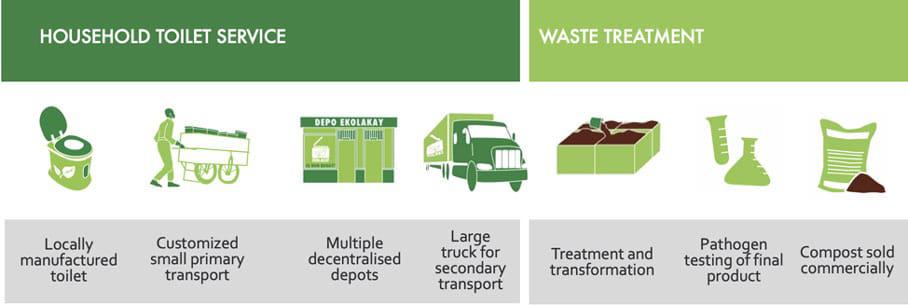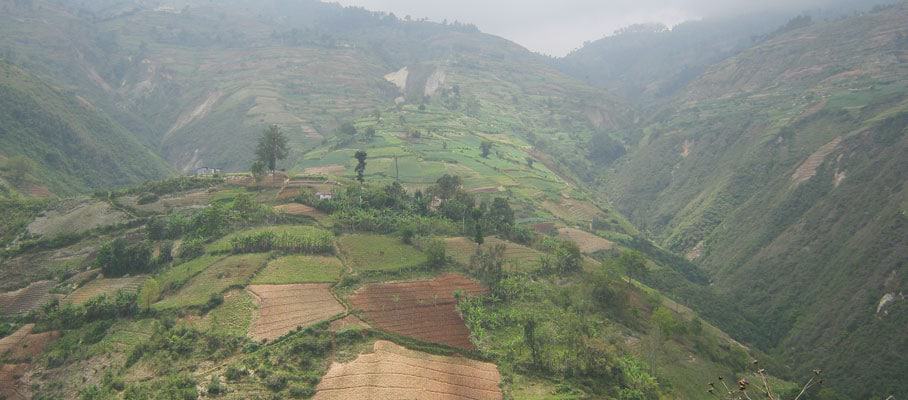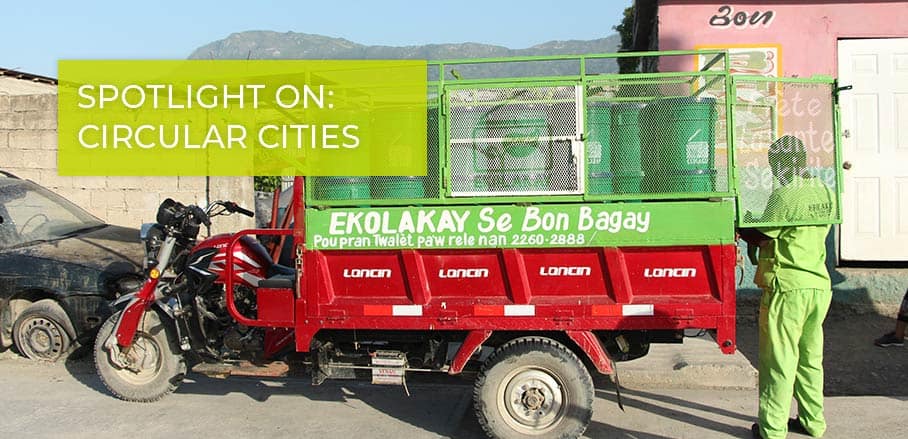Climate Adaptive Sanitation Technology in Haiti
Providing all citizens with access to sanitation is a challenge in many urban centres. Ashlie Bermudez presents how non-profit social enterprise SOIL is meeting this challenge with innovative, sustainable sanitation technology in Haiti.
About SOIL
Sustainable Organic Integrated Livelihoods (SOIL) is a Haiti-based non-profit social enterprise that is setting a global example for how to affordably and sustainably provide safely managed sanitation in Haiti’s rapidly growing urban communities. Since 2006, SOIL has been working to expand access to in-home sanitation through its EkoLakay toilet service. Using a circular economy approach, SOIL provides locally manufactured in-home toilets, weekly household collection of waste, and the treatment and transformation of that waste into rich, organic compost.

A family on SOIL’s EkoLakay service in Cap Haitien, Haiti © Vic Hinterlang
SOIL currently provides lifesaving sanitation services to 9,000 people in urban Haiti and produces more than 150+ tons of nutrient-packed compost annually to help rebuild the island nation’s damaged soils. SOIL’s full cycle solution, which is currently the only safely managed sanitation service in northern Haiti, is consciously and practically
designed to utilise local resources, prevent environmental contamination, and recycle nutrients back into the soil to minimise the footprint of sanitation while restoring local ecosystems. SOIL’s solution is broken down into two connected business models: the EkoLakay household toilet service and the composting waste treatment operation.

Figure A. Depiction of SOIL’s full-cycle sanitation service which exceeds World Health Organization standards for the safe treatment of human waste and meets the United Nations Sustainable Development Goal requirement for safely managed sanitation.
Sanitation Technology in Haiti: Climate Positive Solutions for Vulnerable Ecosystems
Haiti is ranked third in the world for being most vulnerable to climate risks and climate change. Climate change poses a serious threat to many of Haiti’s industries and the overall livelihoods of its people. Though Haiti’s geographical location and topological features certainly increase the nation’s physical vulnerability to the impacts of climate change, the degree of environmental degradation and environmental vulnerability in Haiti is anything but natural.

Aerial view of rural Haiti © SOIL
The impacts of climate change and the pressing need to sustainably provide access to basic services that make our planet and people more resilient have helped to frame SOIL’s model. SOIL’s sanitation intervention in Haiti provides a myriad of positive externalities that aim to build climate resiliency in these vulnerable communities. By using waterless technology and transforming waste into compost, SOIL is focused on providing a service that not only meets the needs of densely populated urban areas, but provides climate positive outcomes.
- Water conservation: SOIL’s container-based, waterless toilets preserve scarce water resources in communities where access to water hookups – that traditional sanitation technology in Haiti relies on – are unavailable. SOIL’s household toilet conserves more than 19,000 gallons of water a year relative to a flush toilet.
- Safe waste treatment: SOIL captures and safely treats over 500 metric tons of waste annually that would have otherwise gone on to contaminate vulnerable aquatic ecosystems and groundwater sources. The waste is collected from households on a weekly service and safely removed and transported out of the densely populated urban settlements to reduce the risk of environmental and public health threats.
- Climate change adaptation: SOIL produces over 150 metric tons of compost each year. Capturing nutrients from human waste recycles and returns nutrients to the soil to restore ecosystems and improve agricultural livelihoods in northern Haiti. SOIL’s compost is used across a wide range of producers and environmental initiatives from urban gardens, to rural agriculture production to reforestation initiatives.
Compost application in particularly damaged landscapes significantly helps to 1) improve the absorptive capacity of topsoil, reducing the risk of flash floods and mudslides, 2) improve soil water retention to help farmers face increasingly frequent drought events, and 3) establish more resilient and healthier soils. SOIL’s toilets are also designed to be resilient to natural disasters and are currently the only sanitation technology used in urban Haiti which does not result in environmental contamination during flooding. - Climate change mitigation: research on SOIL’s full cycle sanitation model revealed groundbreaking insight into the potential for container-based sanitation and off-site composting to offset greenhouses gas emissions when compared to other low-tech solutions. The study found that greenhouse gas emissions from treating waste via off-site composting resulted in a >90% reduction in emissions when compared to pit latrines and septic systems. Furthermore, SOIL’s sanitation system results in the mitigation of 126 kg per capita per year in CO2 equivalents, adding up to nearly 800 kilograms per household per year. The study is an exciting breakthrough for the sanitation sector, revealing the potential for safely managed sanitation to offset harmful greenhouse gas emissions and also shows the opportunity for vulnerable populations to be included in the climate conversation.
Sanitation Technology in Haiti and in a Rapidly Urbanising World
Globally, over 700 million people in urban areas currently lack access to even basic sanitation, and without innovation this problem will only get worse. The global urban population is projected to increase by 2.5 billion people by 2050, with much of that growth concentrated in informal settlements and locations that are highly vulnerable to natural disasters and climate change impacts. That’s why it is critical to identify innovative, climate positive, technological solutions and services to meet the sanitation needs of people living in rapidly growing urban settlements.
Modern sewer systems, which cost millions to build and maintain, in addition to devouring water and electricity, are out of reach for many developing countries. More and more, countries and communities are seeking alternatives. At the same time, the usual flush-toilet alternatives, like pit latrines and septic tanks, are both cost-prohibitive and unsafe, particularly in low-lying coastal cities, which sit on the coast with high water tables and rising sea levels. In addition to being unsafe for the communities using them, pit latrines also create inhumane working conditions for those tasked with emptying them.
SOIL and fellow Container-Based Sanitation (CBS) practitioners are pioneering revolutionary sanitation technologies for growing global cities that are safer, more resilient, and more sustainable due to the recovery of resources that happens through transformation of waste into valuable end products like our rich, organic Konpòs Lakay compost.
SOIL’s revolutionary CBS solution has proven resilient to a high-risk environment, representing a significant breakthrough in the urban sanitation field and opening the potential of scaling rapidly in cities lacking sanitation services.
- Climate Adaptive Sanitation Technology in Haiti - 27. October 2021
